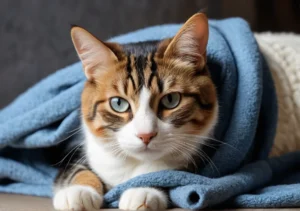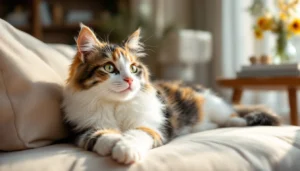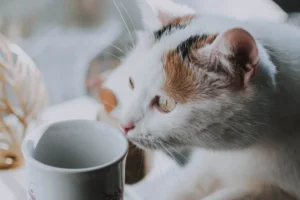Cats are known for their quirky behaviors, and one of the most adorable habits they exhibit is making donuts. But why do cats engage in this circular motion with their paws? Let’s explore the reasons behind this feline behavior.
Cats make donuts as a way to mark their territory, stretch their muscles, and show affection. The circular motion mimics the kneading behavior they exhibited as kittens to stimulate milk flow from their mothers. Now, let’s dive into the various reasons why cats make donuts in more detail:
Territory Marking
Have you ever wondered why cats love to make donuts on your favorite blanket or soft pillow? Well, it turns out that this adorable behavior actually serves a very practical purpose – territory marking. When a cat kneads a soft surface with their paws, they release scent glands located between their paw pads. This scent helps to mark the area as their territory, letting other animals know that this space belongs to them. So, the next time you catch your feline friend making donuts on your bed, remember that they’re just marking their territory and making themselves feel at home.
Stretching and Exercise
Aside from marking their territory, the act of making donuts also helps cats in another important way – stretching and exercise. When cats knead, they engage the muscles in their paws, shoulders, and back, helping to keep them strong and flexible. This kneading motion mimics the stretching and exercise routines that cats would naturally perform in the wild, helping them to maintain good muscle tone and relieve stress.
Next time you see your cat kneading a soft blanket, consider it as their way of keeping in shape and staying healthy. It’s not just a cute behavior; it’s an essential part of their physical well-being. So, embrace the donuts and let your feline friend enjoy their stretching and exercise routine in the comfort of your home.
Extra tip: Provide your cat with interactive toys and scratching posts to encourage healthy exercise and stretching habits outside of their donut-making sessions.
Comfort and Security
Cats make donuts as a way to comfort themselves and feel secure. Just like how some people bite their nails or twirl their hair when they’re anxious, cats knead and make doughy motions to calm themselves down. This repetitive action is soothing for them, almost like a stress ball for humans. So, the next time you catch your cat making donuts, know that they’re just trying to find some inner peace in their own fluffy way.
Affection and Bonding
When your cat makes donuts on you or another animal, it’s their way of showing affection and seeking connection. It’s a bonding experience that they use to express their love and comfort with those they care about. So, if your furry friend starts kneading on your lap or snuggling up to you while making those donuts, feel special because they’re sharing their love with you in their unique feline language.
Additional Unique Insight: Cats also make donuts to mark their territory with scent glands located in their paws. This behavior helps them leave their scent behind, claiming their space and showing ownership in a subtle but effective way.
Feline Instincts
Cats have a unique behavior known as making donuts, where they knead a soft surface with their paws. This behavior is deeply rooted in their feline instincts, harkening back to their wild ancestry. In the wild, kittens knead their mother’s belly to stimulate milk flow while nursing. As they grow older, adult cats continue this behavior as a way to mark territory with scent glands in their paws. So, when your furry friend is making donuts on your lap or a cozy blanket, it’s their way of feeling safe, secure, and at home.
Medical Benefits
Apart from being a cute and endearing behavior, making donuts actually offers several health benefits for our feline companions. The rhythmic motion of kneading helps cats release tension and reduce stress, promoting relaxation and comfort. It can also stimulate blood flow and circulation in their paws, which is beneficial for their overall well-being. Additionally, the act of kneading can help cats express contentment and happiness, strengthening their bond with their human family members.
Extra Tip: Providing your cat with a soft and cozy blanket or bed specifically for kneading can encourage this behavior and offer them a sense of comfort and security.
Training and Behavior Modification
Have you ever wondered why cats like to make donuts on soft surfaces? This behavior actually goes beyond mere kneading; it stems from their instinctual need to mark their territory. By understanding this, cat owners can use the donut-making behavior to their advantage when training their feline companions.
Tip: To encourage your cat to make donuts in a specific area, place a soft blanket or towel in that spot. This way, your cat can satisfy their instinctual need to knead while also keeping your furniture safe from their sharp claws.
For other behavior modifications, such as discouraging scratching on unwanted surfaces, redirect your cat’s attention to a scratching post or pad whenever they start kneading inappropriately. Consistent positive reinforcement with treats or praise can help reinforce the desired behavior. Remember, patience and understanding are key when training your furry friend.
Fun Facts and Trivia
Did you know that cats primarily make donuts on soft surfaces because it mimics the feeling of their mother’s belly during nursing? This comforting behavior carries into adulthood, providing cats with a sense of security and relaxation.
Interesting Fact: The rhythmic motion of kneading also helps cats release pent-up energy and can be a form of self-soothing during times of stress or anxiety. So, the next time you catch your cat making donuts, know that they are simply seeking comfort in their own unique way.
As a bonus, here’s a high-authority external link to further explore cat behavior and training: American Society for the Prevention of Cruelty to Animals – Cat Training Basics
Alex, a passionate animal lover, has experience in training and understanding animal behavior. As a proud pet parent to two dogs and three cats, he founded AnimalReport.net to share insights from animal experts and expand his knowledge of the animal kingdom.




